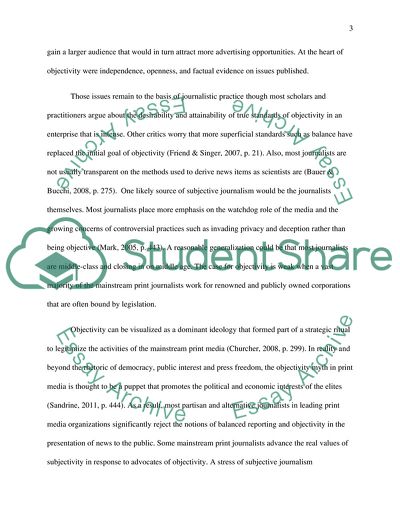Cite this document
(How Crucial Is Objectivity in Professional Journalism Essay Example | Topics and Well Written Essays - 3000 words, n.d.)
How Crucial Is Objectivity in Professional Journalism Essay Example | Topics and Well Written Essays - 3000 words. https://studentshare.org/journalism-communication/1866644-there-are-various-ways-in-which-professional-journalism-is-characterized-but-objectivity-is-crucial-to-many-of-these-discuss-in-relation-to-examples-of-print-or-broadcast-news-reporting
How Crucial Is Objectivity in Professional Journalism Essay Example | Topics and Well Written Essays - 3000 words. https://studentshare.org/journalism-communication/1866644-there-are-various-ways-in-which-professional-journalism-is-characterized-but-objectivity-is-crucial-to-many-of-these-discuss-in-relation-to-examples-of-print-or-broadcast-news-reporting
(How Crucial Is Objectivity in Professional Journalism Essay Example | Topics and Well Written Essays - 3000 Words)
How Crucial Is Objectivity in Professional Journalism Essay Example | Topics and Well Written Essays - 3000 Words. https://studentshare.org/journalism-communication/1866644-there-are-various-ways-in-which-professional-journalism-is-characterized-but-objectivity-is-crucial-to-many-of-these-discuss-in-relation-to-examples-of-print-or-broadcast-news-reporting.
How Crucial Is Objectivity in Professional Journalism Essay Example | Topics and Well Written Essays - 3000 Words. https://studentshare.org/journalism-communication/1866644-there-are-various-ways-in-which-professional-journalism-is-characterized-but-objectivity-is-crucial-to-many-of-these-discuss-in-relation-to-examples-of-print-or-broadcast-news-reporting.
“How Crucial Is Objectivity in Professional Journalism Essay Example | Topics and Well Written Essays - 3000 Words”. https://studentshare.org/journalism-communication/1866644-there-are-various-ways-in-which-professional-journalism-is-characterized-but-objectivity-is-crucial-to-many-of-these-discuss-in-relation-to-examples-of-print-or-broadcast-news-reporting.


